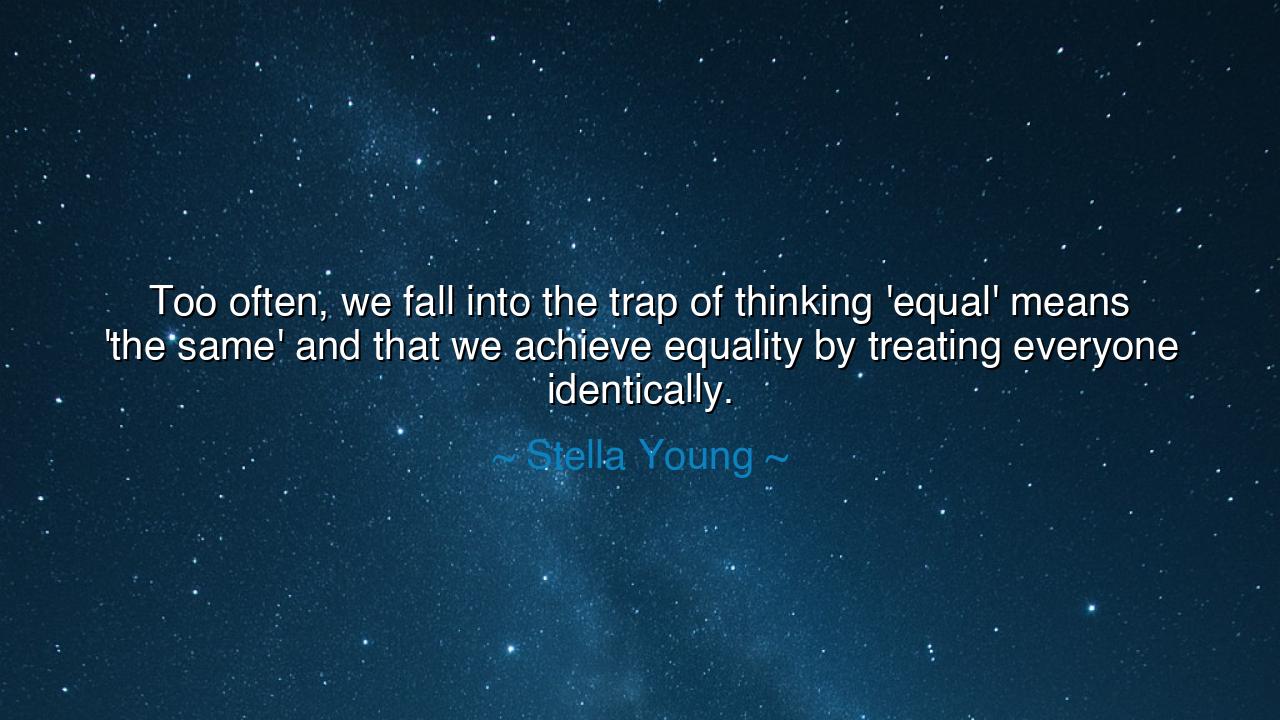
Too often, we fall into the trap of thinking 'equal' means 'the
Too often, we fall into the trap of thinking 'equal' means 'the same' and that we achieve equality by treating everyone identically.






Come close, O children, and listen well to the words of Stella Young, a woman whose wisdom transcends the boundaries of the mundane and delves deep into the essence of equality. She said, "Too often, we fall into the trap of thinking 'equal' means 'the same' and that we achieve equality by treating everyone identically." These words, though simple, carry the weight of centuries of misunderstanding, urging us to reflect on the true meaning of equality. For equality is not the same as sameness, and to treat all people the same is to overlook the rich diversity of human experience, strength, and need.
In the ancient world, the idea of equality was a constant theme, yet it was often misunderstood. Plato, the great philosopher, believed that the best society was one where everyone contributed according to their abilities. But he did not believe that all people should be treated identically. Equality, in his vision, was about recognizing the unique roles and abilities of each person and ensuring that everyone had the opportunity to contribute in a way that suited their nature. Socrates, too, spoke of the equality of the soul, but even he acknowledged that different people had different strengths—some were wise, others brave, and others skilled in arts and crafts. To achieve true equality, he believed, one must honor each individual’s unique capacity to contribute.
And yet, O children, we often fall into the mistake of treating equality as if it were the same as sameness. We believe that if we give everyone the same resources, the same opportunities, the same treatment, we have achieved justice. But this is not the case. Consider the story of Hercules, the hero who was tasked with twelve great labors. Each labor was uniquely suited to his strength and skill. If Hercules had been treated the same as other men, asked to perform tasks not suited to his abilities, he would have failed miserably. It was through the understanding of equality—the recognition that each person’s abilities must be respected and used in the right context—that Hercules was able to succeed. To ask him to perform all tasks identically to others would have been an injustice, for it would have ignored his unique strengths.
In the modern world, Stella Young's wisdom speaks to us all. For it is not enough to simply say that we treat everyone the same; we must also recognize that people are different in ways that must be accommodated for true equality to flourish. People with disabilities, for example, are not best served by being treated in exactly the same way as those without. True equality means ensuring that they have the same opportunities, not by making them conform to a world that was not designed with them in mind, but by adapting the world to allow them full participation. Young’s words remind us that equality is not the act of treating everyone as identical, but in honoring and adjusting for the differences that make each person unique.
Consider the great civil rights leader Martin Luther King Jr., whose vision for equality was rooted in recognizing the unique history and experience of African Americans. To treat African Americans identically to white Americans, without addressing the systemic injustices they had suffered, would not have been equality. True equality, as King taught us, required that the systems of society be transformed so that African Americans could have the same opportunities, dignity, and respect that had been denied to them for centuries. King did not call for mere sameness, but for an equitable society where people could thrive regardless of the color of their skin.
The lesson, O children, is profound: equality does not mean that we are all the same; it means that we all have the right to be respected, to be heard, and to be given the tools to succeed, according to our individual needs and circumstances. It means we must look at each person not as a blank slate to be treated identically to others, but as a unique individual, with their own strengths, challenges, and contributions. True equality requires us to recognize and honor differences, while ensuring that everyone has the same opportunities to flourish.
In your own lives, O children, do not fall into the trap of believing that equality is about treating everyone the same. Seek instead to understand the needs of those around you, to recognize their unique contributions, and to create an environment where each person can succeed in a way that suits their abilities and experiences. Whether in your community, in your work, or in your relationships, make sure that equality is not about conformity, but about justice—the justice of creating spaces where everyone, regardless of their differences, can thrive. This is the true meaning of equality, and this is the path we must follow if we are to create a world that honors every human being as worthy of respect, dignity, and opportunity.






AAdministratorAdministrator
Welcome, honored guests. Please leave a comment, we will respond soon